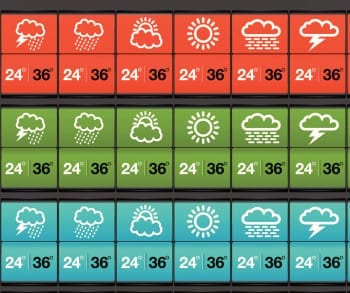The human race has prospered by relying on forecasts that the seasons will follow their usual course, while knowing they will sometimes be better or worse. Are things different now?
For the fifth time, the Intergovernmental Panel on Climate Change claims they are. The panel assumes that the relatively small human contribution of carbon dioxide to the atmosphere will cause dangerous global warming. Other scientists disagree, arguing that the climate is so complex and insufficiently understood that the net effect of human carbon dioxide emissions cannot be forecast.
The computer models that the IPCC relies on are complicated representations of the assumption that human carbon dioxide emissions are now the primary factor causing climate change. The modelers have correctly stated that they produce scenarios, or stories constructed from a collection of assumptions. Well-constructed scenarios can be very convincing, in the same way that a well-crafted fictional book or film can be. However, scenarios are neither forecasts nor the product of a validated forecasting method.
The IPCC modelers were apparently unaware of decades of research on forecasting methods. I, along with Dr. Kesten Green, conducted an audit of the procedures used to create the IPCC scenarios. We found that they violated 72 of 89 relevant scientific forecasting principles. (Find the principles of evidence-based forecasting on my site here.) Would you board your flight if you overheard the ground crew discussing how the pilot had violated 80 percent of the preflight safety checklist?
Given the expensive policies implemented in the name of preventing dangerous man-made global warming, we are astonished that there is only one published peer-reviewed paper that claims to provide scientific forecasts of long-range global mean temperatures. The paper is Green, Armstrong and Soon’s 2009 article in the International Journal of Forecasting.
This paper examined the state of knowledge and the available empirical data to select appropriate evidence-based procedures for long-range forecasting of global mean temperatures. Given the complexity and uncertainty, we concluded that the “no-trend” model is the method most consistent with forecasting principles.
We tested the no-trend model using the same data that the IPCC uses. We produced annual forecasts from one to 100 years, starting from 1851 and stepping forward year-by-year until 1975—the year before the current warming alarm was raised. (This is also the same time when Newsweek and other magazines reported that scientists were “almost unanimous” that Earth faced a new period of global cooling.) We conducted the same analysis for the IPCC scenario of temperatures increasing at a rate of 0.03 degrees Celsius (0.05 degrees Fahrenheit) per year in response to increasing human carbon dioxide emissions. This procedure yielded 7,550 forecasts for each method.
Overall, the no-trend forecast error was one-seventh the error of the IPCC scenario’s projection. The no-trend forecasts were as accurate as, or more accurate than the IPCC temperatures for all forecast horizons. Most importantly, the relative accuracy of the no-trend forecasts increased the longer the horizons. For example, the no-trend forecast error was one-twelfth that of the IPCC temperature scenarios for forecasts 91 years to 100 years ahead.
Our climate change forecasting research in progress scrutinizes more forecasting methods, uses more and better data, and extends our validation tests. The findings strengthen the conclusion that there are no scientific forecasts that predict dangerous global warming.
There is no support from scientific forecasting for either an upward or downward trend in temperatures. Without support from scientific forecasts, the global warming alarm is baseless and should be ignored.
Government programs, subsidies, taxes and regulations proposed in response to the global warming alarm result in misallocations of valuable resources. They lead to inflated energy prices, declining international competitiveness, disappearing industries and jobs, and threats to health and welfare.
Climate policies require scientific forecasts, not computerized stories about what some people think might happen.
Editor’s note: The views above are those of the author and do not represent the views of the Wharton School or the editors of Wharton Magazine. Professor J. Scott Armstrong is a founder of two major journals on forecasting methods, author of Long-Range Forecasting, editor of the Principles of Forecasting handbook and founder of forecastingprinciples.com. He has been doing research on forecasting methods for more than a half-century.

























